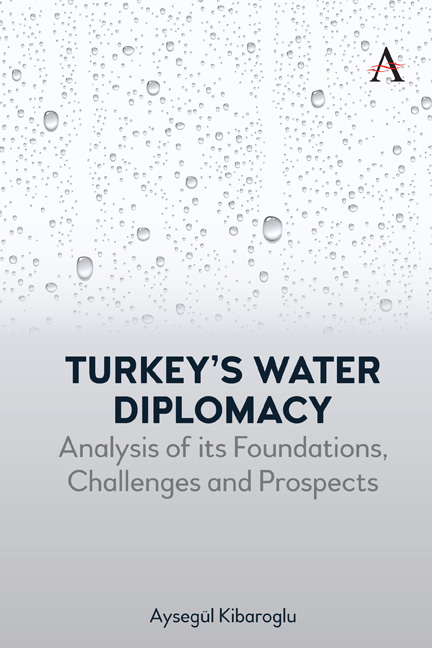Book contents
- Frontmatter
- Contents
- Acknowledgements
- List of Abbreviations
- Introduction
- 1 Institutional Setting
- 2 Water Diplomacy Principles
- 3 Turkey’s Evolving Position vis-à-vis International Water Law
- 4 The Role of History and Geography in Turkey’s Evolving Water Diplomacy
- 5 Analyzing Non-State Actors and Processes in Turkey’s Water Diplomacy Framework
- Conclusion
- References
- Index
5 - Analyzing Non-State Actors and Processes in Turkey’s Water Diplomacy Framework
Published online by Cambridge University Press: 24 March 2021
- Frontmatter
- Contents
- Acknowledgements
- List of Abbreviations
- Introduction
- 1 Institutional Setting
- 2 Water Diplomacy Principles
- 3 Turkey’s Evolving Position vis-à-vis International Water Law
- 4 The Role of History and Geography in Turkey’s Evolving Water Diplomacy
- 5 Analyzing Non-State Actors and Processes in Turkey’s Water Diplomacy Framework
- Conclusion
- References
- Index
Summary
Overview
Water diplomacy covers a complex array of water management problems that can be best understood as a product of competition, feedback and interconnectivity between natural and societal variables within a political context (Islam and Susskind 2013). Although we currently observe the emergence and increasing presence of non-state actors within the framework of water diplomacy, states are nonetheless pivotal in its practice. Hence, previous chapters of this book have expounded upon the discourses and practices of water diplomacy as have been implemented by the Turkish state, analyzing its institutional foundations in the context of the country's historical and geographical realities.
Broadening the view, however, this chapter offers a look at the role nonstate actors play in Turkey's water diplomacy framework (WDF); investigating if and how epistemic communities, academia and civil society contribute to transboundary water policymaking. Particular attention has been paid to a Track II initiative, namely the Euphrates-Tigris Initiative for Cooperation (ETIC), which was established in 2005 by a group of scholars and professionals from Turkey, Syria and Iraq in the Euphrates-Tigris (ET) river basin.
The chapter concludes with a presentation of the best practices and lessons learned from the history of Turkey's water diplomacy. Keeping an open dialogue with its neighbours over transboundary water issues as well as signing of several bilateral water agreements (i.e. best practices) can be seen as achievements in Turkish water diplomacy. Yet, lack of a comprehensive river basin treaty and Turkey's (non-party) position towards global and regional (European) conventions still constitute stumbling blocks from which lessons should be drawn. The chapter offers a non-zero-sum approach to water negotiations in making policy-relevant recommendations for tackling with future challenges in Turkey's water diplomacy.
Non-State Actors in Turkey's Water Diplomacy Framework
Track II Water Diplomacy: Euphrates– Tigris Initiative for Cooperation*
The international arena is no longer the exclusive domain of foreign ministries and diplomats. Aside from the efforts of official diplomats, civil society and academia play an important role in establishing connections and building trust between various parties (Huntjens and de Man 2017).
Track I diplomacy is typically carried out by government officials, who use bargaining, negotiation and other peaceful means to negotiate treaties, trade policies and other international agreements – including those aimed at preventing, limiting, managing or settling conflict.
- Type
- Chapter
- Information
- Turkey's Water DiplomacyAnalysis of its Foundations, Challenges and Prospects, pp. 123 - 142Publisher: Anthem PressPrint publication year: 2021

